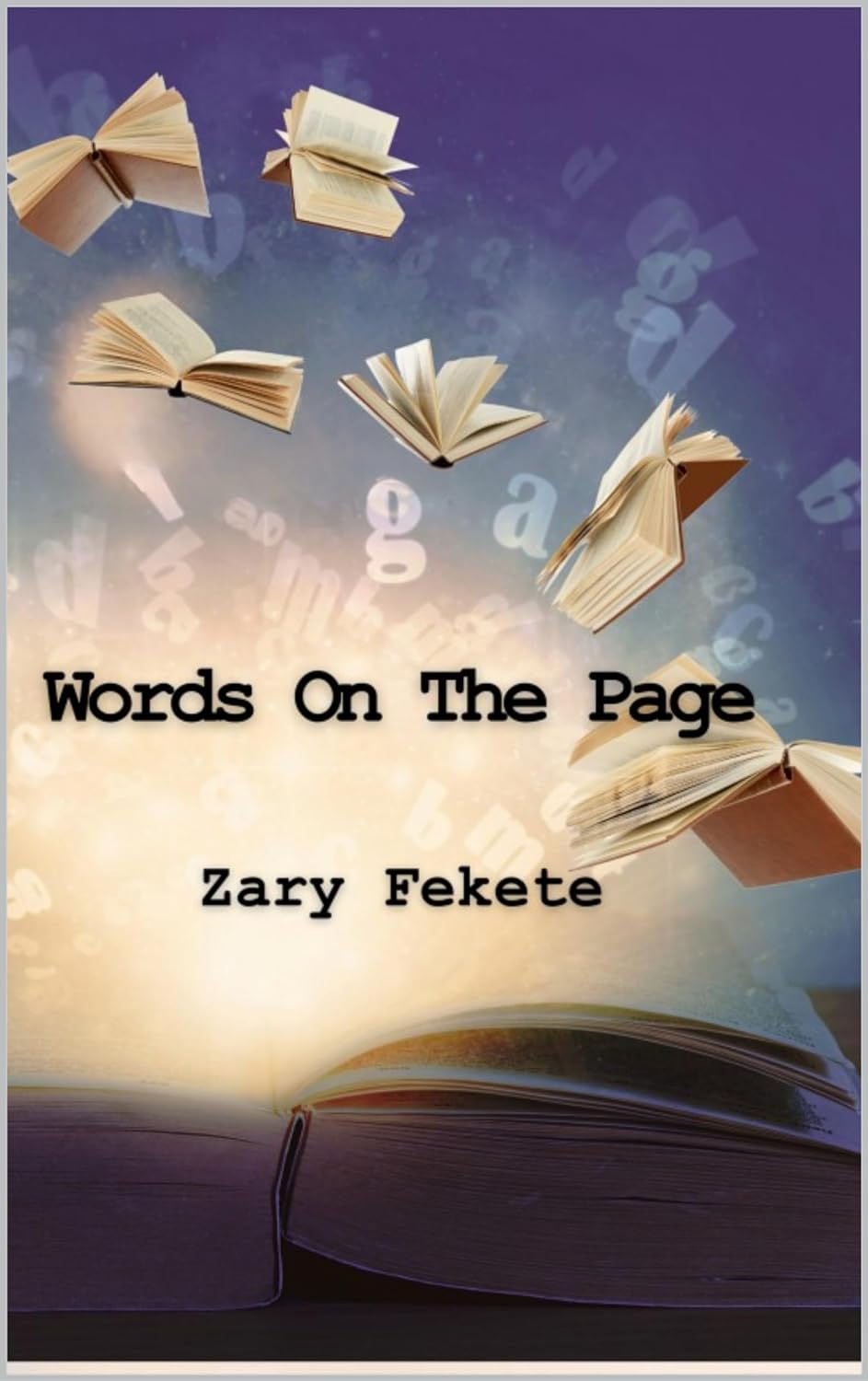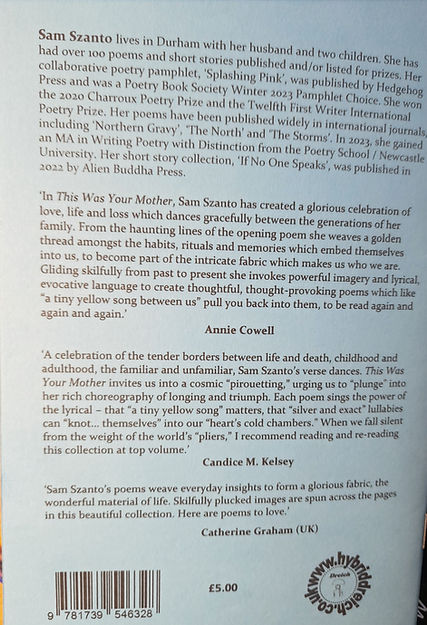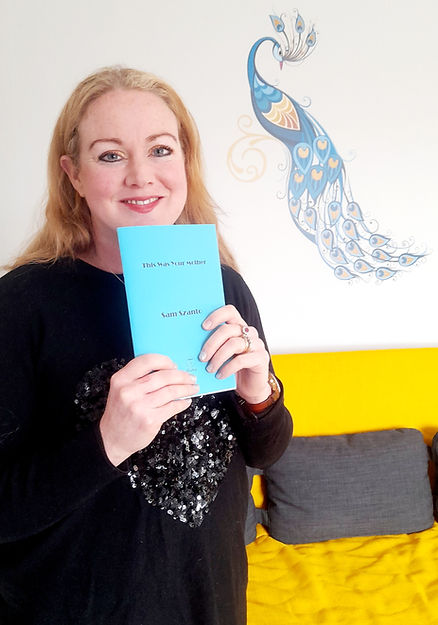Zary Fekete: 'This novella reminded me how much of my life is positively coloured by my love of reading'
- samszanto2
- Apr 10, 2024
- 8 min read

A chat with Zaqary Fekete about their novella, Words on the Page (DarkWinter Press, 2024)
In Words on the Page, you have created a dystopian world where technology, particularly AI, has continued to have an enormous and negative impact on humanity. Can you tell us a bit about the genesis of / inspiration for the novella?
The original idea for this story came to me after I read Nathaniel Hawthorne’s short story “Rappaccini’s Daughter”; in fact I reference it in the novella. The story involves a young man who spies a beautiful girl working in a garden. He learns that the plants in the garden are all poisonous, but the girl has developed an immunity to the poison over time. This was a favourite story of Sylvia Plath (she loved to teach it to her students), and I have used it in classrooms settings as well. I was curious whether the elements of that story could be updated to a modern or even futuristic setting, and that is where this novella began.
One of the themes of the book is the importance of reading. Can you talk about the importance of reading in your own life?
My mother read books out loud to me and my two sisters when we were growing up in Hungary. She read a variety of children’s books to us, but, from time to time, she would specifically choose to read books that were slightly above our learning level so that we would be encouraged to reach deeper into literature. Some of favourites she read to us were The Chronicles of Narnia series, My Antonia, and To Kill a Mockingbird. I have loved reading every since, and I have carried on a similar tradition in reading to my two sons.
Everything you write feels very fresh, very ‘you’. I wonder whether you are inspired by other dystopian authors / novels, too, though, and if so which ones?
Probably like many avid readers, I love George Orwell’s two famous novels 1984 and Animal Farm. I am also a tremendous fan of Ray Bradbury’s Fahrenheit 451 and also many of his short stories which have important elements of moral truth in it. I am a child of the 80s and have fond memories of seeing various dystopian films during that decade such as The Road Warrior and Robocop. Last year I was at a film festival and I was fortunate enough to meet Ed Neumeier, the writer of Robocop. He was inspired to write that film through exploring various 1980s comic books including Judge Dredd which is a series I enjoyed reading in my early teen years. It’s probably best that my parents didn’t know I was reading those comic books in light of their subject matter😊
In the novella, Dr McCaffery talks about ‘net-cleansing’ and ‘this insane online world’, saying ‘there’s so much of our human existence vitally tied into the infrastructure of the web’. The narrator then notes that these aren’t new ideas, which of course they’re not, but very interesting nonetheless. Can you talk about these ideas in the context of the novella?
I tend to have a high degree of internet scepticism. I nod my head when I read articles about the dangers of overexposure for young people; but, I am also a hypocrite because I am online a lot and I have my own daily routine of which websites I enjoy reading. I also have two sons who are very, very online. I suppose it is the combination of those two truths (my own perspective on the online existence and my observance of my sons’ online lives) which prompts me to think about these ideas quite a lot. Even though there is no overarching Artificial Intelligence governing the web currently, it certainly can feel that way at times. I’m probably not alone in being shocked when I discover I’m being served an online advertisement for something I was just talking about during a conversation with a friend. It certainly feels like our phones are listening to us, doesn’t it?
This feels like a similar question, but I was taken by the line: ‘Scientists who study the web have long ago seen a correlation between web use and psychic damage to the user’s mind and body’. Obviously this is not ‘you’ writing, and it’s a work of fiction, but I wonder, do you think this is true?
At a core level I probably do think that the internet has made it more difficult for people to concentrate on certain tasks which would have been much easier before everyone was online. I put myself forward as exhibit #1. I can tell that I myself have a harder time focusing on a book if I start the day with the internet rather than with the page. Consequently, I like to start the day reading books on the page before transitioning to the web. I also end the day with a physical book rather than the internet. I can’t claim I’ve purposefully planned this system with much foresight, but it helps me fall asleep if the last thing I am looking at is not a webpage but rather words on paper.
On that topic, I wonder how it feels for you as an author to engage with the internet? I feel that nowadays to promote oneself, it’s impossible not to use online resources to do so – especially as an independent author – but I think for most people there’s a certain ambivalence to it, especially the social media aspect.
It is entirely true to say the internet has allowed me to succeed (to whatever degree I have) in writing. When I read biographies of writers from decades or centuries past I marvel at how easy it has become to put my words out into the world with such ease. Past generations of writers were completely tied to the physical analogue world, and they would likely be astonished by how freely writers today are able to market themselves with minimal effort.
Dr McCaffery writes in his letter to Zach: ‘You are among the 0.01 percent of people on earth who have still some rudimentary memory of encountering written words on a page’. I can tell from having my own children at school that there is more of an emphasis on reading online than there was even five years ago, although they still read physical books too. Do you imagine that we’re going in this direction as writers and readers: that one day there could be very few, if any, books left in the world?
It’s a great question you are asking. I remember reading about two famous library fires (The destruction of Library of Alexandria and the Los Angeles Library fire in the 1980s), and I was horrified by the thought of so many books being destroyed. I remember reading articles about the creation of the Kindle back in the mid 2000s and, perhaps like many people, I was fascinated by the idea that it might be possible to carry around thousands of books in our pockets. We live in a world which once didn’t have books on paper, and it’s possible to tie the spread of certain historical ideas to the advent of the printing press. For example, it allowed Christian philosophy to be far more widely available to the lay person whereas before that it was information only reserved for priests and Catholic clergy. Because of what a special experience it is to open a book for the first time I truly hope physical books never go extinct.
I’m fascinated by names in general, and in how authors come up with them for their characters. I noted that your own name, ‘Zaqary’ is very similar to the protagonist’s, ‘Zachary’. Is there a reason for this?
There is😊 My given name is Zakariás which is the Hungarian version of Zachariah. I have used Zaqary as a pen name of sorts. When it came time to name the main character of the book I decided to make it the English version of my given name and also of the more modern spelling of the biblical name. My parents once told me that my name means “God has remembered”. I found that fascinating, and it unlocked within me a fascination with names and their meanings.
When I spoke to you more generally about writing nearly a year ago, you said that ‘Writing has become a kind of healing form of therapy for me’. Is that still true and if so, I wonder whether you could talk about that more specifically in terms of this novella? Do you think different forms of writing heal authors differently? Do some heal more than others? I know you also write poetry, and am wondering whether that feels more or less therapeutic?
Writing has been and continues to be a huge source of therapy for me. I entered recovery for alcohol addiction in February 2018. During the following months I met many other people at various stages of their own recovery journeys. One of the unifying elements of each person’s journey was this: they all wrote. Not everyone wrote the same things. Some wrote prayers. Some wrote personal statements of life purpose. Some wrote lists. But writing was part of all of our recovery. I have a collection of short stories coming out this year which is specifically ordered around writings I did related to recovery.
In that interview, you said (when I asked you whether writers should have morals): ‘I think the most important reason to write is if the writing does something good for the writer.’ Did writing this book do something good for you? Would you like to talk about what that was, if so?
Writing this book absolutely provided me with some very valuable life experiences. Before I wrote this novella, I had attempted to write a novel. Up until that point I had ever only written shorter pieces. The novel-writing process showed me how little I knew about structuring a longer work. While I would be foolish to self-judge my work on this novella, I can confidently say that it holds together better than my attempt at the longer novel. This novella also reminded me how much of my life is positively coloured by my love of reading. I felt like the writing process of this project took me through a journey of personal reading enjoyment and also made me want to continue to read as extensively as possible.

Julie in the novella reads forty to fifty books a day. Beyond the abilities of most of us, I’m sure! How many do you get through on an average week?
I wish I could come close to how much reading Julie does😊 I suppose I average about one book a week. I start most days with reading and probably read about 50 pages a day.
Julie quotes the first lines of many of the classics to save Zach. What’s your favourite first line from a book (or any text)?
I don’t know if this is necessarily my favourite, but I do enjoy the first line of Charlotte’s Web which is “’Where’s Papa going with that axe?’ said Fern…”
Colour is integral to the book: red and blue in particular. I wonder why you chose these two colours in particular? I understand the association of red with danger, did you choose blue because it’s a calming colour or for some other reason?
When I was a boy I read a series of children’s fantasy novels by John White, a Canadian author. He used blue and red as contrasting colours for good and evil. I probably used these colours here because it is still embedded in my subconscious as the truth.
In the denouement of the novella, the web has gone. What do you think would happen if this became reality? Could we live without it now?
In many ways the web has changed the world for the good. But many days I wish I could transport myself back in time to the 1980s (to my childhood) and re-experience the world at a slower pace. I keep promising myself that I will give up the web for a set period of time as a way to purge my system. Perhaps it’s finally time to give that a try😊
Buy Words on the Page here: http://a-fwd.com/asin=B0CZJDVR54










Comments